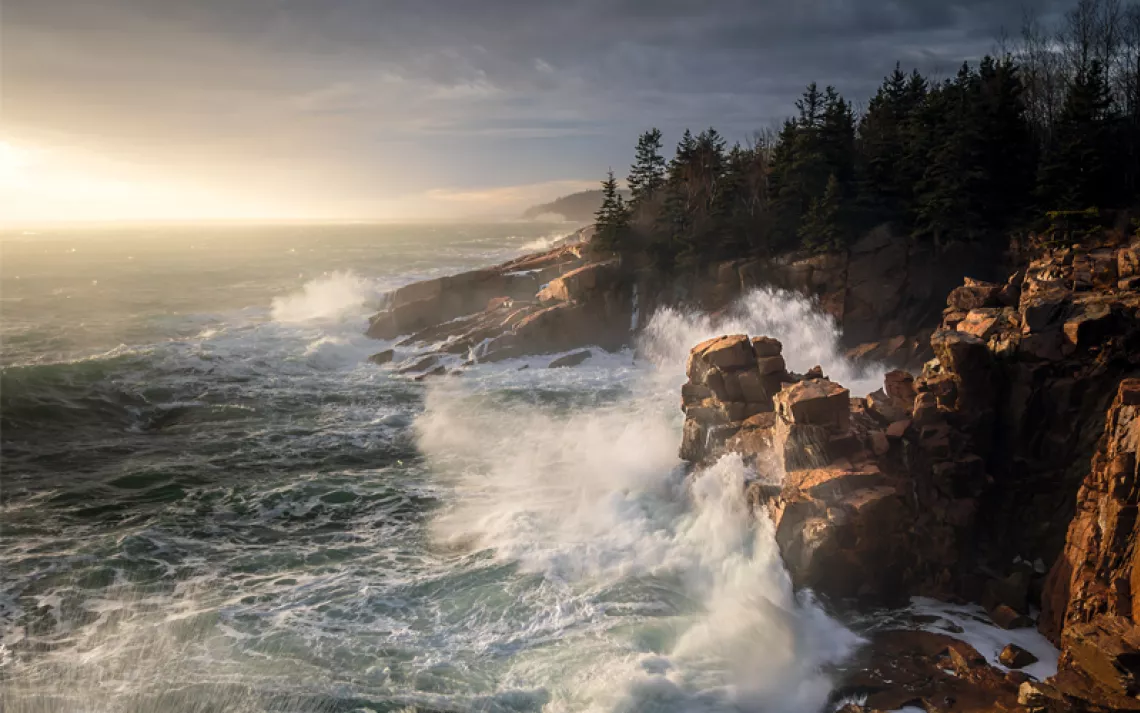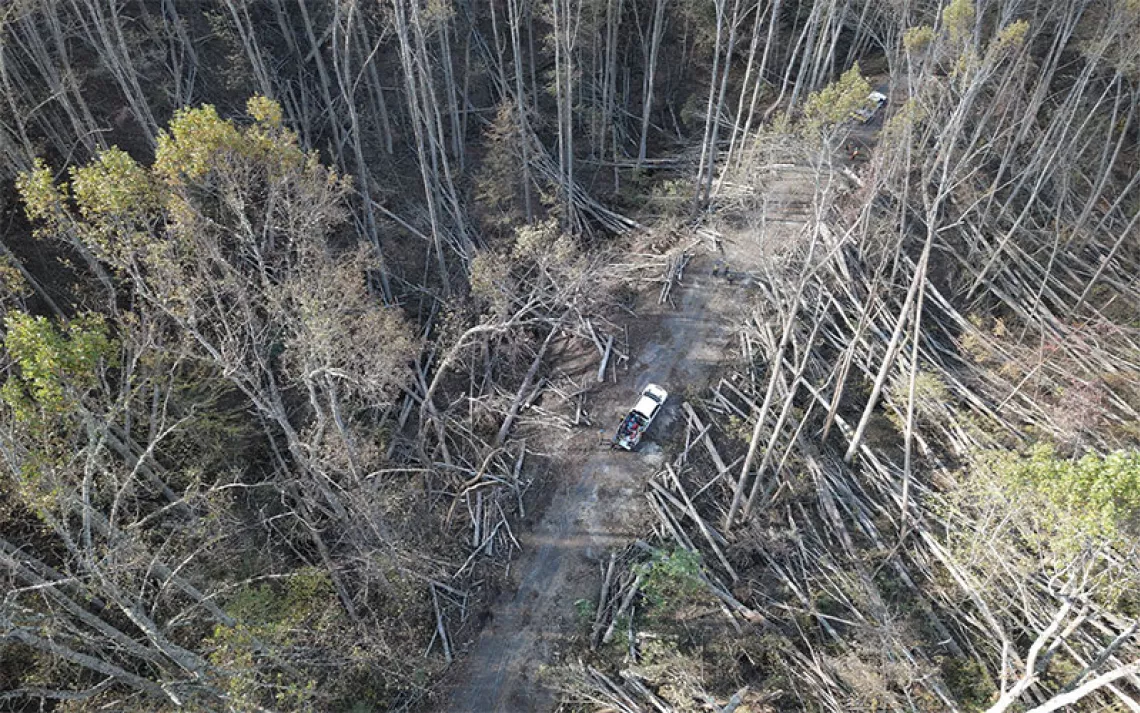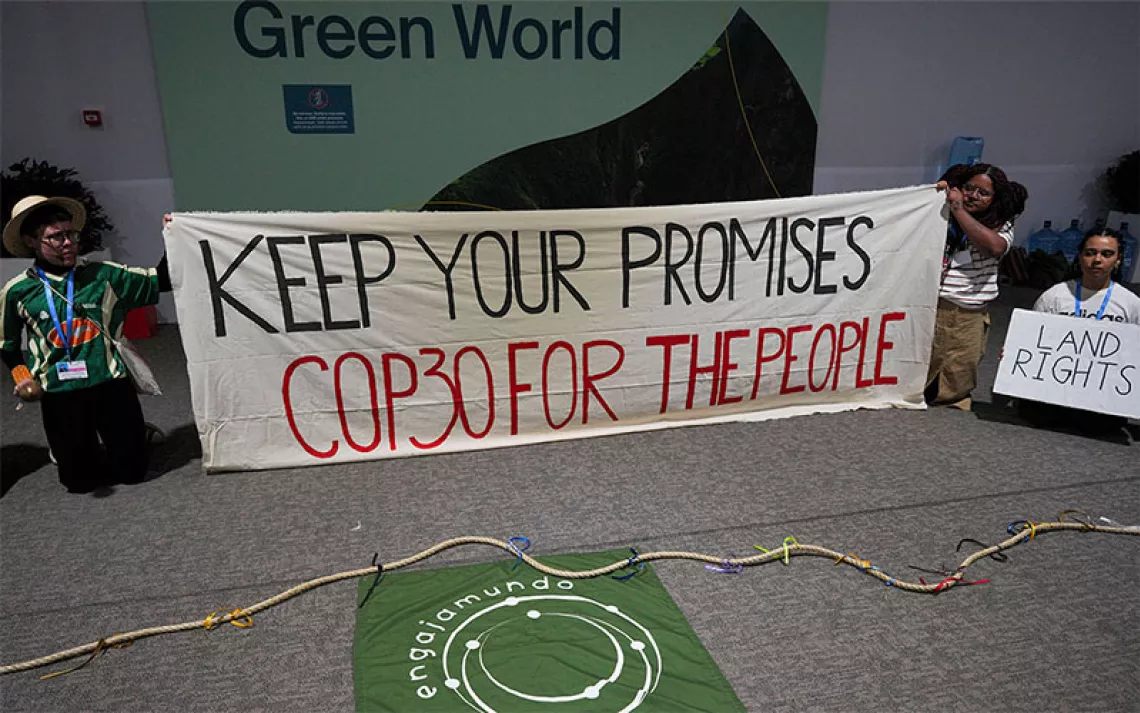The Manchin Side Deal Could Keep the Mountain Valley Pipeline Alive
Community organizers resisting the project say they won’t be traded away

The Mountain Valley Pipeline route on Brush Mountain in Virginia. | Photo by Heather Rousseau/The Roanoke Times via AP Images
In late July, a broad coalition of grassroots activists from across Appalachia were scrambling to file statements about the controversial Mountain Valley Pipeline before the public comment period expired. Just one month earlier, the pipeline developer had requested a four-year extension of its certificate to complete the project carrying fracked gas across more than 300 miles of farmlands, mountains, rivers, and streams. Organizers from local groups such as Protect Our Water, Heritage, Rights (POWHR), and Mountain Valley Watch, along with the Sierra Club and 7 Directions of Service, were mobilizing to register opposition to the extension request. It was the latest round in their six-year campaign to halt the pipeline before it could be completed.
On July 27, two days before the Federal Energy Regulatory Commission’s deadline for comments was set to close, a historic investment in renewable energy and climate programs was announced. Once passed, the Inflation Reduction Act would allocate billions of dollars to electrify the nation’s transportation system, support disadvantaged environmental justice communities, and invest in renewable energy systems. Many climate activists across the country celebrated the news.
But for those in the Appalachian states still fighting the Mountain Valley Pipeline, news of the act came with a bitter pill to swallow: a reported handshake agreement between Senator Joe Manchin and Democratic leaders that would, among other things, legislate the completion of the Mountain Valley Pipeline.
“We were up against FERC’s comment deadline, a very short window when people could make their voices heard that we don’t want this polluting pipeline in our backyards, and then the news broke,” Russell Chisholm of Mountain Valley Watch told Sierra. “I spoke to many impacted people on that day of and the days since, and many described it to me as a gut punch. The overriding sentiment was one of betrayal.”
Today, September 8, organizers will converge on Capitol Hill for a rally and lobbying day to try to sink what’s being called the Manchin side deal. “There is power in numbers,” Crystal Cavalier, a resident of Mebane, North Carolina, told Sierra. She’s a cofounder of 7 Directions of Service and a longtime organizer against the Mountain Valley Pipeline as well as a member of the Occaneechi Band of the Saponi Nation. “We’re going to shut this down," she said. "We have a lot of people we are networking with, and they’ll be in DC to speak to their representatives. We have buses scheduled to take people there, from Virginia to West Virginia. When people show up in numbers, they can change policy.”
The Manchin side deal wasn’t part of the final text of the Inflation Reduction Act that President Joe Biden signed into law on August 16. But news that Democratic leaders are considering the deal—and that the American Petroleum Institute was not only lobbying for it but actually wrote the original draft—has thrown a wet blanket over the Inflation Reduction Act celebrations. The side deal, if enacted, would overhaul the permitting process for oil and gas projects and undercut environmental reviews of such projects under the National Environmental Policy Act. While the Mountain Valley Pipeline isn’t explicitly named in the draft written by the American Petroleum Institute, projects like it would directly benefit if the language became law. Policymakers are expected to take up the deal when they return from recess this month.
Organizers throughout Appalachia feel they are at risk of being sacrificed to deliver climate action. “I was furious,” Chisholm says. “Who else was at that negotiating table who thought that was a fair deal? We certainly weren’t in the room when that discussion took place. The other leaders in Congress and the White House were having those discussions and apparently thought that was a fair trade-off. Well, we’re not going to be traded off.”
Since the fracking boom began in the Marcellus Shale more than a decade ago, fossil fuel companies have sought to get the gas produced there to power plants and plastics-manufacturing complexes in other parts of the country. Two major pipelines were proposed to transport the gas: the Atlantic Coast Pipeline, a 600-mile behemoth that would have sliced up forests from West Virginia to North Carolina while zigzagging across the Appalachian Trail; and the smaller but still sizable Mountain Valley Pipeline, a 303-mile gambit to transport 2 billion cubic feet of fracked gas per day from Joe Manchin’s West Virginia across southern Virginia.
Community organizers along the proposed routes have fiercely opposed both projects over concerns that the pipelines would damage national forests, impact water quality and endangered species, jeopardize public safety, and permit the use of eminent domain to seize land for construction. In 2020, after years of litigation and organized resistance, the controlling company behind the Atlantic Coast Pipeline, Dominion Energy, announced it was walking away from the project altogether.
But the Mountain Valley Pipeline has endured. And it has left a track of destruction in its wake.
The pipeline has been beset by woes since its developer first broke ground. In 2019, the commonwealth of Virginia brought a lawsuit against Mountain Valley Pipeline, LLC, for causing significant erosion in the southwestern part of the state. The company lost the lawsuit and was ordered to pay a $2.5 million penalty. It's just one example of dozens of documented instances of environmental destruction the pipeline’s construction has wrought, including hundreds of water quality violations. Its construction route disproportionately impacts communities of color. In 2019, when concerns were raised that the pipeline excavators had ignored the presence of Indigenous burial mounds when mapping out its route, the company described the mounds in a letter to FERC as “a pile of rocks.”

Photo courtesy of Crystal Mello
Six years after the pipeline was first proposed, it is now billions of dollars over budget and years behind schedule. In spite of its troubled history and the laundry list of environmental violations, on August 23, FERC granted Mountain Valley Pipeline, LLC, the four-year extension it was seeking to complete the project.
“We’ve shown over and over again that the gas that would be brought through this pipeline is not needed,” Kelly Sheehan, the senior director of energy campaigns at the Sierra Club, said. “Now here comes the Inflation Reduction Act, which provides a big boost to a clean energy economy in ways that will further displace any need for gas, with electricity needs being met by solar and wind and incentives for energy efficiency. These are more reasons why this gas isn’t needed in our economy. That’s why Joe Manchin is trying to legislate its way into existence.”
Manchin has received more political contributions from the oil and gas industry than any other member of the Senate. Pipeline companies like the one building the Mountain Valley Pipeline have donated $331,000 to Manchin this year alone.
The Inflation Reduction Act represents a once-in-a-generation investment in renewable energy at exactly the moment when the United States needs to address the climate crisis. But the new law only addresses one side of the climate equation: While the law ramps up investment in clean energy, it does nothing to phase down the fossil fuel production that threatens civilization. In fact, to make the act palatable to Manchin, the act guarantees drilling opportunities in Alaska and the Gulf of Mexico. Meanwhile, the Manchin side deal, if enacted, would fast-track polluting projects like the Mountain Valley Pipeline.
Community organizers who applaud the Inflation Reduction Act for its historic investment in clean energy and environmental justice say that their lands and homes, their water and air should not be sacrificed in the name of climate progress.
“There are real lives at stake with this,” Crystal Mellow, a community organizer with the POWHR Coalition, said. In addition to organizing, she has also joined tree-sitters to protest the Mountain Valley Pipeline’s route through her community. “We are being turned into a sacrifice zone. I get that the Inflation Reduction Act is great for a lot of different reasons such as cutting emissions and tax cuts for electric vehicles. But people in our community are not buying electric vehicles. They can’t afford it. So to have this Manchin deal go through would be an insult.”
“We don’t have much down here,” Mellow continued. “What we do have is a wonderful river and beautiful landscape. We have clean air. A lot of us don’t go to the Cascades to hike or to the beach. We go to the river down the road. We count fireflies. We enjoy what we have right here as an under-income community. We may be under-resourced in some ways, but we’re rich in natural resources. We shouldn’t have to sacrifice the little bit that we have.”
 The Magazine of The Sierra Club
The Magazine of The Sierra Club



